Key takeaways:
- Engagement in marketing is about building genuine connections, not just metrics like likes and shares.
- Contests are effective for creating community and generating valuable user-generated content, while also informing business strategies.
- Thorough planning, including clear guidelines and appropriate timing, is essential for successful contests.
- Analyzing contest results by demographics and participant behavior yields insights that can refine future strategies.
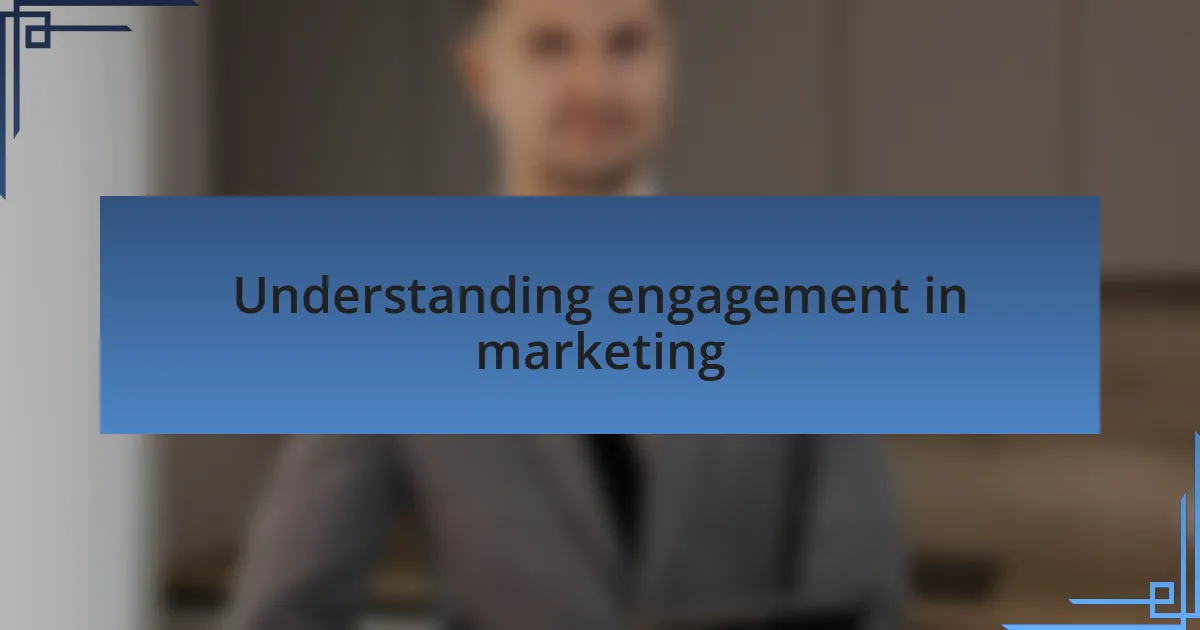
Understanding engagement in marketing
Engagement in marketing goes beyond mere likes or shares; it’s about building genuine connections with your audience. I still remember launching a contest where participants had to share their stories related to our brand. The responses were overwhelmingly personal and heartfelt, transforming our understanding of what engagement truly means. Could engagement be the bridge to trust that leads to lasting customer relationships?
When I think about engagement, I often reflect on a time when an interactive poll we conducted sparked a lively discussion among our followers. It was fascinating to see how a simple question could unleash creativity and involvement. This experience taught me that asking the right questions not only invites participation but also taps into the collective voice of your audience. Isn’t that what we hope to achieve in the ever-growing digital landscape?
I’ve noticed that actively listening to engagement metrics can reveal untapped opportunities for deeper connections. For example, after monitoring responses from our recent campaign, we pivoted our messaging to match our audience’s genuine interests. This not only increased our engagement rates but also enhanced customer loyalty. How often do we pause to evaluate what our audience is truly saying? In my experience, it’s this kind of insight that fosters a community rather than just a customer base.
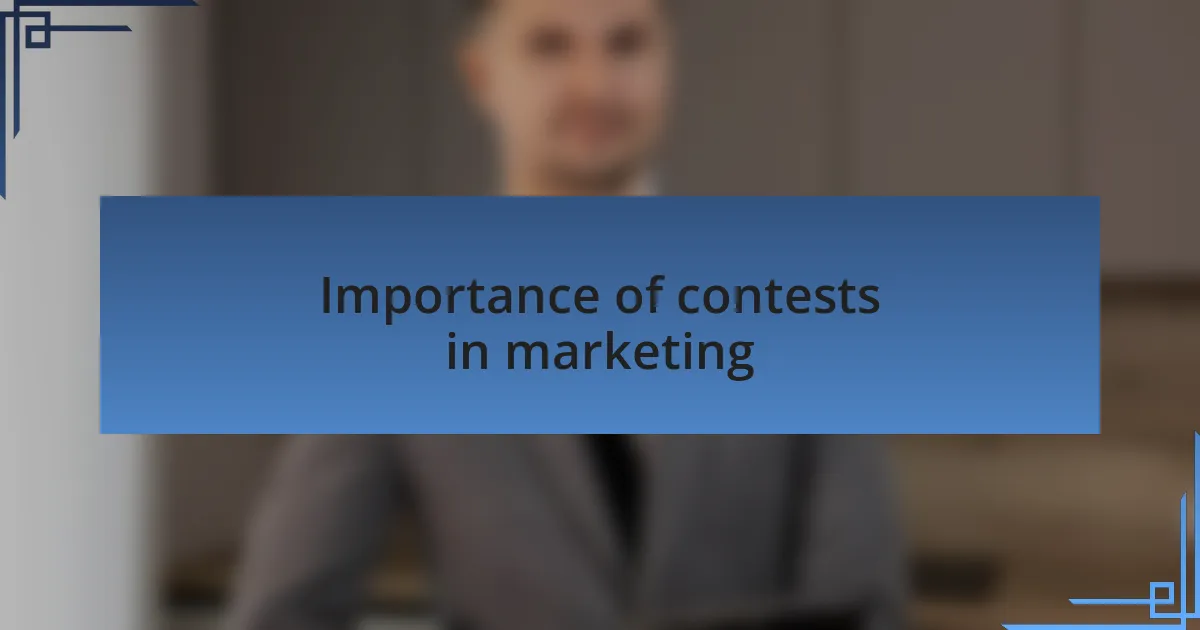
Importance of contests in marketing
Contests hold a unique place in marketing, acting as powerful catalysts for engagement. I remember organizing a photo contest where participants showcased their creativity using our product. The excitement and anticipation surrounding the contest not only boosted participation but also created an authentic buzz around our brand, leading to an influx of user-generated content. How often do we create moments that not only engage but also empower our customers?
Beyond just participation, contests foster a sense of community among participants. I once received multiple heartfelt messages from contestants thanking us for providing a platform to express themselves. This reminded me that a contest isn’t just a marketing tactic; it’s an opportunity to connect on a deeper level. Can a simple contest be the thread that weaves loyal customers into a thriving community?
In terms of data, the insights gleaned from contest participation are invaluable. With every entry, I was able to analyze trends and preferences, which informed our product development cycle. This experience highlighted how contests can serve as dual-purpose tools, fueling both engagement and business strategy. Isn’t it fascinating how much we can learn from our audience when we invite them to participate in something fun and interactive?
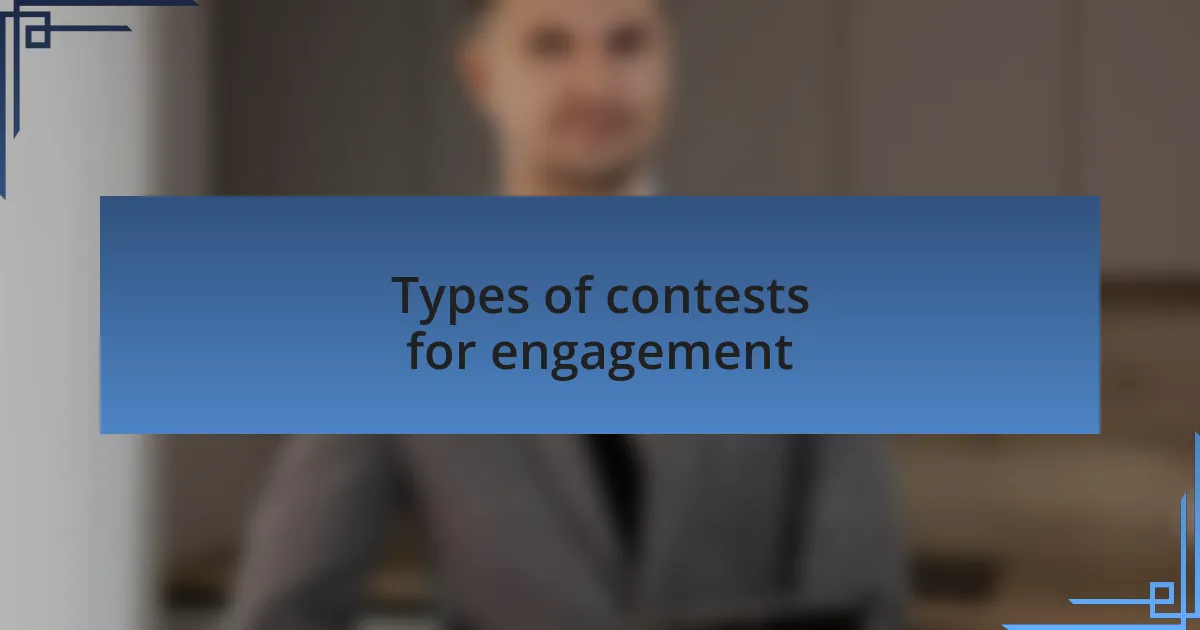
Types of contests for engagement
Contests come in various forms, and understanding the right type for your audience is key to driving engagement. For instance, I’ve found that trivia contests can spark excitement while educating participants about our brand. When I hosted a quiz-based contest, the enthusiasm was palpable; people enjoyed testing their knowledge and competing for prizes. This approach not only engaged users but also strengthened their understanding of our services. Who knew that learning could be so much fun?
Another effective type is the user-generated content contest. When I initiated a video contest encouraging users to share their unique experiences with our product, the results were astonishing. People poured their creativity into their submissions, which fostered a sense of ownership and pride in our community. I realized that it’s not just about the entries; it’s about allowing customers to share their stories, creating a narrative that resonates deeply with others. Isn’t it incredible how sharing personal stories can forge meaningful connections?
Finally, social media challenges can be a game-changer for engagement. I remember launching a hashtag challenge that encouraged users to post content themed around our brand. The virality was thrilling, as people jumped on board, creating a lively environment filled with fun and interaction. The unpredictability of social media contests keeps the energy high, and it can turn casual followers into enthusiastic participants. Can you envision the excitement when your audience starts to spread your message organically?
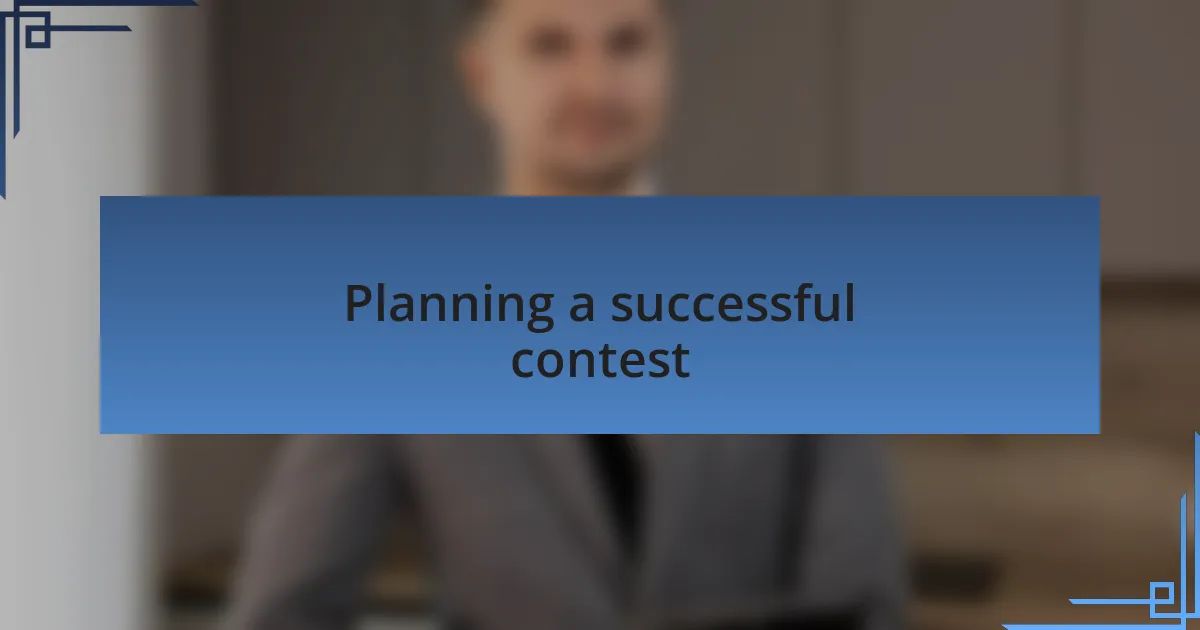
Planning a successful contest
To ensure a contest resonates with your audience, thorough planning is essential. I remember meticulously mapping out the details for a photo contest; I wanted to create clear guidelines to avoid confusion. The clarity made participants feel confident in their submissions, and that sense of empowerment translated into higher engagement rates. Have you ever noticed how direction can transform uncertainty into excitement?
Next, selecting the right timeline for your contest is crucial. From my experience, I learned that launching during peak engagement times, such as weekends or holiday seasons, significantly boosts participation. In one instance, I scheduled a contest to coincide with a popular local event, and the turnout exceeded my expectations. It’s fascinating how timing can elevate the effectiveness of a campaign, don’t you think?
Lastly, consider the prizes you offer. I’ve found that unique and relevant rewards can drive more entries than generic ones. During a recent contest, I partnered with a local business to provide exclusive experiences as prizes. The response was overwhelming, as participants eagerly shared in hopes of winning something truly special. It’s rewarding to see the community rally around something that resonates with their interests.
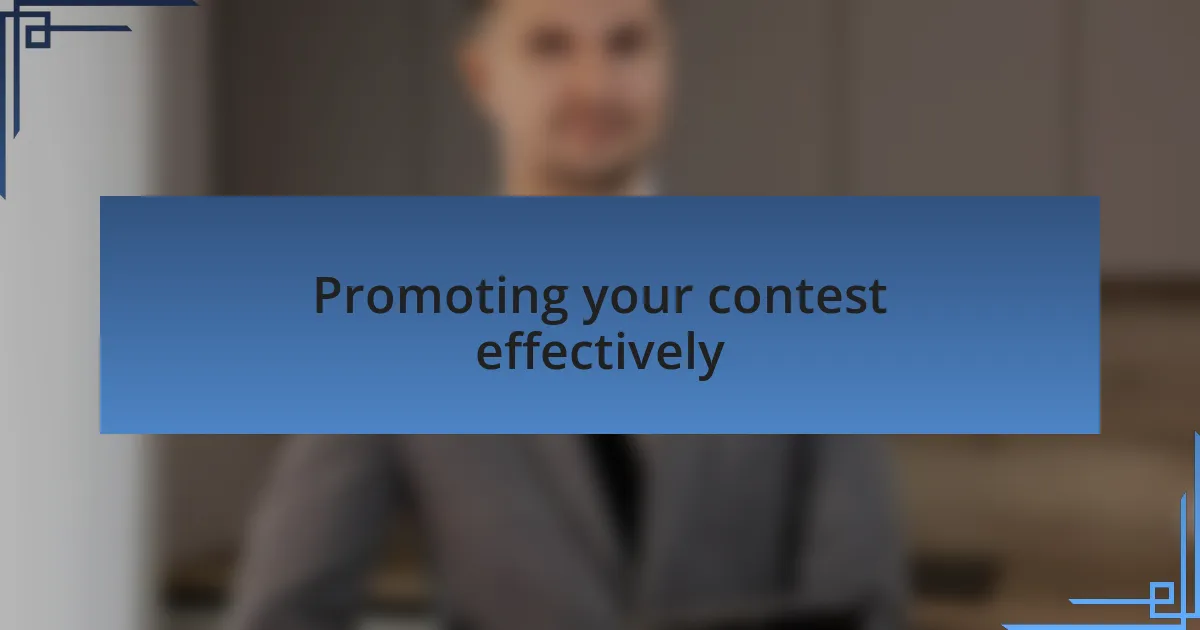
Promoting your contest effectively
When it comes to promoting your contest, leveraging social media is key. I recall a time when I created an Instagram story campaign that not only showcased the contest details but also featured sneak peeks of the prizes. This behind-the-scenes look generated buzz and excitement, inviting followers to get involved. Have you ever wondered how a simple story could create such a wave of interest?
Utilizing email marketing can also amplify your contest’s reach. I’ve crafted targeted emails that not only shared the contest information but highlighted participant testimonials from past contests. This approach lent authenticity, making recipients feel more connected and encouraged. Isn’t it powerful how hearing from others can motivate you to join in?
Another effective strategy I found is collaborating with influencers who share your values. I once partnered with a micro-influencer who aligned closely with our brand, and their genuine endorsement led to a surge of entries. Seeing someone you trust promote a contest makes you more inclined to participate, doesn’t it? This kind of partnership can bring an entirely new audience to your contest, enriching the experience for everyone involved.
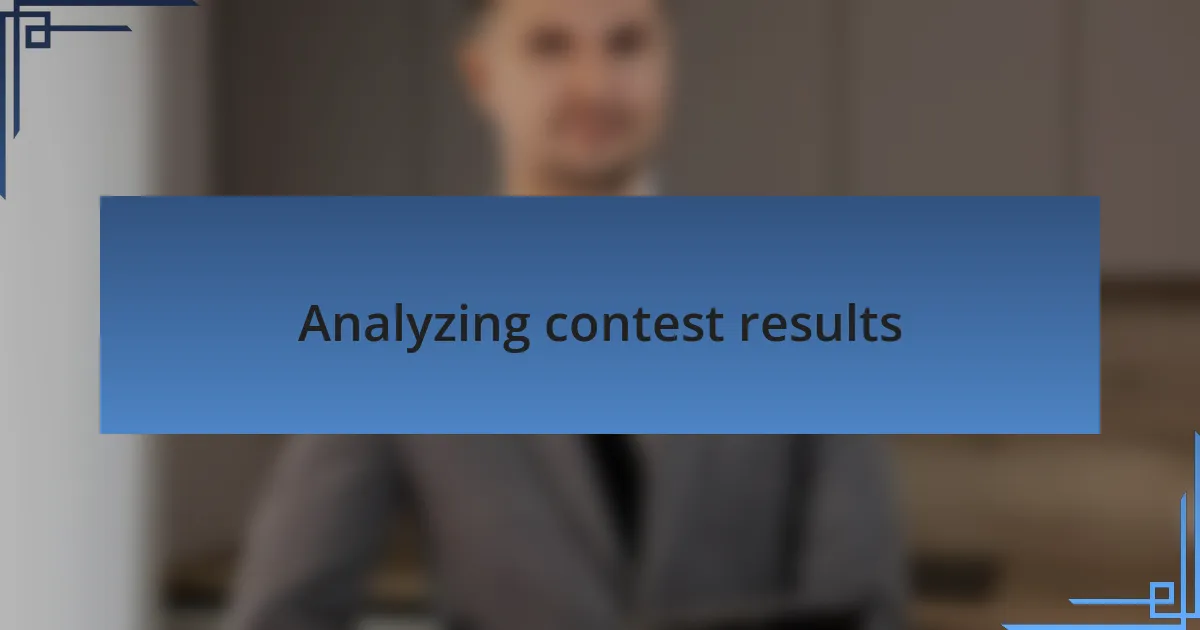
Analyzing contest results
Analyzing contest results is an essential step to gauge the effectiveness of your engagement strategies. I remember diving into analytics after a holiday giveaway I hosted, comparing entry numbers against engagement rates on various platforms. It surprised me to discover that while Facebook had the most entries, Instagram saw higher engagement from followers who commented and shared posts. Have you ever noticed how different platforms yield varied participant behavior?
To make sense of the results, I often segment the data by demographics and entry methods. For instance, I was amazed to find that younger participants preferred mobile entries, while older demographics showed a trend towards email submissions. This insight helped me tailor future campaigns to better meet my audience’s preferences. Isn’t it enlightening to see how nuanced people’s choices can be based on their habits?
Lastly, I always consider qualitative feedback from participants. After my last contest, I encouraged entrants to share their thoughts on our website. The genuine feedback provided rich insights into what resonated with them and what didn’t. Have you ever received unexpected praise or constructive criticism that reshaped your approach? Understanding the emotions and motivations of your entrants can be a game changer in refining your contest strategies.
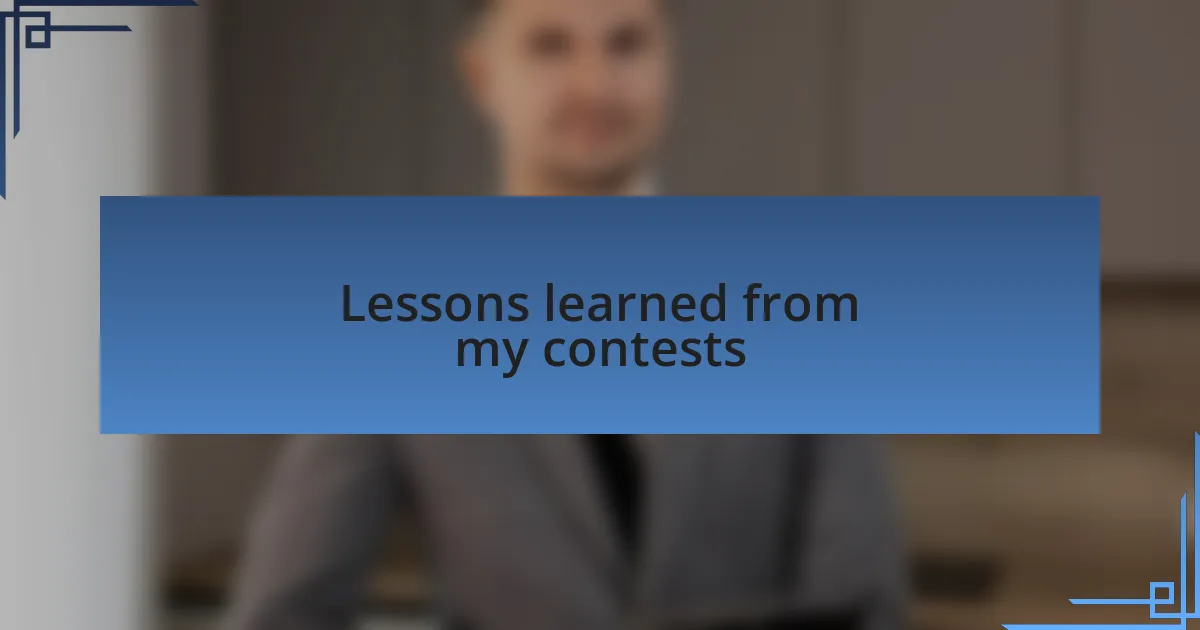
Lessons learned from my contests
One of the biggest lessons I learned was the importance of clarity in contest rules. Early on, I hosted a photo contest, and I remember the confusion it sparked among participants about submission guidelines. This led to a flood of disqualified entries, and honestly, it was disheartening to see genuine efforts go unnoticed. Have you ever seen excitement turn into frustration due to unclear instructions? From that experience, I’ve made it a priority to simplify and clarify rules, ensuring participants feel confident in their submissions.
Another eye-opening takeaway revolved around the timing of announcements. I used to think that launching a contest in the early morning would generate maximum exposure, but I soon learned that timing varied significantly across different audiences. I recall launching a weekend contest only to realize most of my target audience was offline enjoying their days. Now, I analyze past contest engagement metrics to find the sweet spot for announcements. Does your audience have a unique rhythm that you’ve tapped into?
Lastly, interacting with participants during the contest has proven invaluable. I recall a contest where I took the time to respond to comments and share updates personally. The sense of connection it fostered was remarkable; entrants felt seen and valued. This personal touch often leads to increased loyalty and encourages more active participation in future campaigns. Have you ever felt a lasting connection after a simple acknowledgment? The power of personalization can make a significant difference in fostering community.